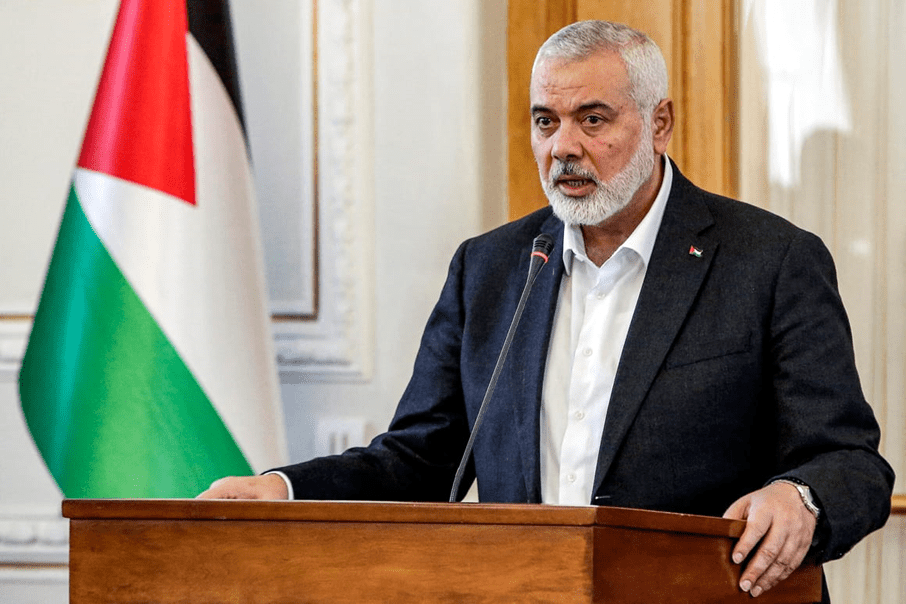
Ismail Haniyeh, Hamas Political Leader, Assassinated in Tehran
Fiona Nanna, ForeMedia News
6 minutes read. Updated 10:01PM GMT Wed, 31 July, 2024
Ismail Haniyeh, the influential Hamas political leader, was assassinated early Wednesday morning in Tehran, Iran. The assassination took place at a residence where Haniyeh was staying, and also claimed the life of a bodyguard. The Palestinian group Hamas has condemned the killing as “a treacherous Zionist raid,” linking it to the broader context of Israel’s ongoing conflict with Gaza.
Haniyeh, 62, was in Tehran to attend the inauguration of Iran’s new president, Masoud Pezeshkian, which took place on Tuesday. His assassination comes almost ten months into Israel’s extensive military campaign against Gaza. While Israel has not officially claimed responsibility for the attack, an Israeli minister publicly celebrated Haniyeh’s death on social media, exacerbating the tensions surrounding the incident.
Born in the Shati refugee camp near Gaza City, Haniyeh grew up as the son of parents displaced from Asqalan (now Ashkelon) during the establishment of Israel in 1948. His early years were marked by activism; he was a student leader at the Islamic University in Gaza, where he joined the Islamic Student Bloc in 1983, a precursor to Hamas.
The first Intifada, which began in December 1987, saw Haniyeh actively participating in the uprising against Israeli occupation. It was during this period that Hamas was founded, with Haniyeh among its early members. Over the years, Haniyeh was imprisoned by Israel multiple times, including a notable three-year sentence before being deported to Lebanon in 1992 along with other Hamas leaders.
After returning to Gaza in 1993, following the Oslo Accords, Haniyeh became a close associate of Sheikh Ahmed Yassin, Hamas’s founder and spiritual leader. Haniyeh’s prominence grew as he played a key role in Hamas’s operations and political strategies. Despite surviving an assassination attempt in 2003, Yassin and other prominent Hamas leaders were targeted and killed by Israeli forces.
In 2006, Haniyeh’s political influence surged when Hamas won a significant victory in the Palestinian legislative elections, leading to his appointment as the Prime Minister of the Palestinian Authority (PA). This victory, unexpected by the international community, particularly the United States, led to severe financial sanctions and aid cuts from Western governments.
Tensions between Hamas and Fatah escalated, resulting in Haniyeh’s dismissal by PA President Mahmoud Abbas and the formation of a Hamas-led government in Gaza in 2007. The subsequent siege imposed by Israel and Egypt has persisted for 17 years, with Haniyeh remaining a staunch advocate for Palestinian resistance against the blockade.
As head of Hamas’s political bureau from 2017, Haniyeh continued to influence Palestinian diplomacy from various locations, including Turkey and Qatar. His role as a negotiator and diplomatic figure saw him engage with multiple international actors, including Iran, a key supporter of Hamas.
The recent escalation in violence, including the October 7 attacks on southern Israel and subsequent retaliatory actions, has heightened the risk for Hamas leaders. Haniyeh, who has lost numerous family members in the conflict, including his sons and grandchildren, was a vocal critic of the siege and its impact on Gaza’s civilian population.
Diana Buttu, a Palestinian lawyer and former legal adviser to the Palestinian negotiating team, reflects on Haniyeh’s legacy: “He will be remembered for his unwavering demand for freedom and his resilience, even as his family faced relentless attacks.”
Haniyeh’s assassination is a significant event in the ongoing struggle between Hamas and Israel. Previous Israeli attempts to eliminate Hamas leaders have not halted the group’s operations, as noted by analyst Hassan Barrari. The enduring conflict continues to shape the political landscape in the Middle East.
Backlinks:
- Hamas Political Leader Assassinated
- Palestinian Resistance and Its Leaders
- Impact of Israeli Military Campaign on Gaza

